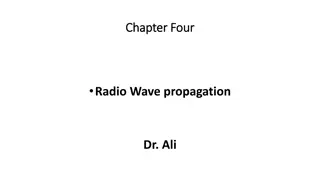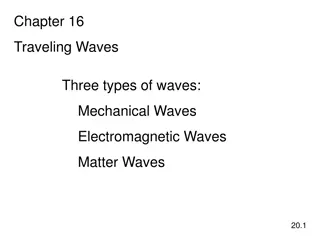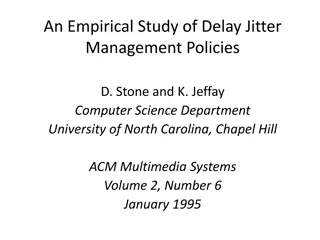Waiting for the Right Wave: The Delay of Gratification
This content explores the significance of delaying gratification, as evidenced by the Stanford Marshmallow Experiment and its longitudinal outcomes. It discusses the impact on academic performance, financial stability, health, and overall life outcomes, along with the influence of socioeconomic status on an individual’s ability to delay gratification. The entrenched mental scripts surrounding gratification and financial behaviors are also highlighted, shedding light on the complexities of decision-making and future outcomes.
Download Presentation

Please find below an Image/Link to download the presentation.
The content on the website is provided AS IS for your information and personal use only. It may not be sold, licensed, or shared on other websites without obtaining consent from the author.If you encounter any issues during the download, it is possible that the publisher has removed the file from their server.
You are allowed to download the files provided on this website for personal or commercial use, subject to the condition that they are used lawfully. All files are the property of their respective owners.
The content on the website is provided AS IS for your information and personal use only. It may not be sold, licensed, or shared on other websites without obtaining consent from the author.
E N D
Presentation Transcript
Waiting for the Right Wave: The Delay of Gratification Georgann Zachary Willis, Ph.D. Assistant Professor of Psychology Umpqua Community College
Stanford Marshmallow Experiment Walter Mischel s late 60s/early 70s studies using Bing Nursery School children (4-6 yrs old) Presented children with a choice of one small, visible reward immediately or two small rewards if they waited for a short period (15 minutes) a visible treat was placed on a plate in front of them and they were left alone in the room If they delayed gratification by not eating the treat, they get two treats when the researcher returns
Benefits of Delaying Gratification Longitudinal studies revealed children who were able to wait longer for preferred rewards tended to have more positive life outcomes Better academic performance Earn and save more money Better physical health and greater happiness Less likely to go to jail Less likely to be overweight/obese Less likely to use drugs
SES and Delay of Gratification Mischel originated his idea while studying different groups in Trinidad where he found the lower SES group were less likely to delay gratification While delay of gratification has often been described as a middle class value it most likely comes down to the stability and reliability of the environment a child experiences growing up When people are unreliable and having enough resources is not guaranteed a mental script developed that the best course of action is to live for today and use it before it gets taken away
SES and Delay of Gratification Mental scripts developed early in life are hard to break, even if the environment changes 78 out of 100 NFL players are bankrupt within three years of retirement 60 out of 100 NBA players go completely broke within five year of retirement Winning the lottery if you are low SES doubles your chances of bankruptcy High levels of personal debt and bankruptcy in middle SES are driving a reconsideration of hypothesized middle class delay of gratification
Learning Self-Control Self-control is the ability to control emotions and behavior to limit our impulses One of the most replicated findings is that self- control is finite, we only have a limited amount and it gets depleted as we use it The strategy then is to increase the amount of resources we have to draw on to exert self-control
Learn How to Manage Your Stress Being under stress uses up our stored energy and make us choose short-term outcomes over long term goals
Change Your Perception Cool the hot aspects of your environment (remove emotion from it) Change I can t to I don t I can t limits you and reminds you that you are being forced I don t is a self-affirmation which shows you are in control of the situation and making an active choice to stick to your plan
Get Enough Sleep Lack of sleep creates a chronic stress that impairs the body and the brain, this leaves the prefrontal cortex impaired Noted sleep researcher Daniel Kripke found people who sleep between 6.5 and 7.5 hours a night live the longest, are happier and most productive Women tend to need a bit more sleep than men (20 minutes on average)
Learn to Meditate As little as 8 weeks of brief daily meditation will improve attention, increase focus, lower stress and increase self-awareness
Better Exercise and Nutrition Your brain may only be 3% of your body weight but it needs 20% of your oxygen and glucose to run it efficiently Exercise increases blood flow and oxygen to the brain Both mindful, relaxing exercise such as yoga and intense physical training provides benefits A healthy diet increases energy levels which allow the brain to work more efficiently
Not Now, But Later We are less tormented by temptation when we eventually receive a reward This also helps to cool our hot environment, we are not victims who can t but people who can, but not right now























